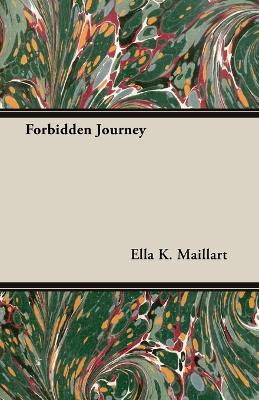Reviewed by brokentune on
Suddenly I understood something. I felt now, with all the strength of my senses and intelligence, that Paris, France, Europe, the White Race, were nothing.... The something that counted in and against all particularisms was the magnificent scheme of things that we call the world."
Forbidden Journey, Maillart's account of the trip that her travel companion Peter Fleming described in his book News from Tartary, was a bit of a revelation. I learned so much from this book - not just about the journey, China and the cultures of the Chinese in the 1930s, but also about perspectives and how they change - or stay the same over time.
Of course, Forbidden Journey describes the same trip from Beijing across China and into India via Kashmir that Fleming's more widely known account does. Like Fleming's book Forbidden Journey is the record of accomplishment of a trip that very few adventurers have managed to describe to a Western readership since the days of Marco Polo.
When Maillart set out on her trip in 1935, she soon had to abandon her plans of travelling alone. Because of the political upheaval in China at the time - Japanese invasion of Manchuria, the rise of the Communist army - roads were blocked and warrants issued for anyone who did not have the right papers, the right connections, or the right demeanor. It was at this point that Maillart joined forces with Peter Fleming, older brother of Ian and political correspondent for The Times, who had also planned to follow the Silk Road across China - by himself.
Neither of them wanted to join forces, but the alternative for both would have been to abandon the trip. Together, they could produce enough languages, life skills, money, and passports/visa to at least leave Beijing - and try and by-pass the official control posts.
Forbidden Journey may not be the most elegantly written one of the two books. Peter Fleming was evidently a more skilled writer than Maillart, but Maillart was the more diligent observer. She was the one that notices things - people's dress, people's demeanour, their circumstances. Maillart picked up on nuances of the everyday life that she and Fleming encountered and made time in her book to record them, sometimes comment, rarely judge. And this is the part that makes her book - and by reflection Maillart as a person - special: Maillart did not try to compare the things she sees with other things known to her. By that, she did not try to validate her observations and experiences against a Western belief system - at least not often. She rather took in everything she saw and tried to understand it against the background she encountered it in.
To my recollection, the only exception to this, where she did comment on something she saw is when she encountered Chinese women who had their feet bound. Maillart was upset by this and mentioned it a few times. Foot binding was officially banned in 1912 but was still common practice in rural areas into the 1930. But then, was Maillart moved by this because she thought it was wrong by European standards or was she upset to see the practice because there had been criticism of the practice throughout China since at least the 1870s? Having read Maillart's other books, I have no doubt that her concern was caused by her humanist approach to whatever people she met.
Anyway, I could go on fan-girling about Maillart, who was an extraordinary person, but I shall leave her biography to speak for her.
What did impress me at the end of the book, both books actually, were the different outlooks both Maillart and Fleming took away from the trip:
On arriving in India, both weary travellers, sun tanned, clad in what can only be described as rags after months of travail by foot, camel, horseback, they checked into a hotel and went to dinner. Both had hoped for months for this very moment that they could enjoy a meal prepared by a proper chef and a drink, but the enjoyment was somewhat spoilt by the reactions from the other hotel guests.
Soon after, Fleming returned to the UK by the quickest route possible to rejoin society. Maillart on the other hand, though returning to Europe, would make it her life's ambition to never again be part of an exclusive society. She did pretty well on that, too.
Reading updates
- Started reading
- 31 May, 2015: Finished reading
- 31 May, 2015: Reviewed
